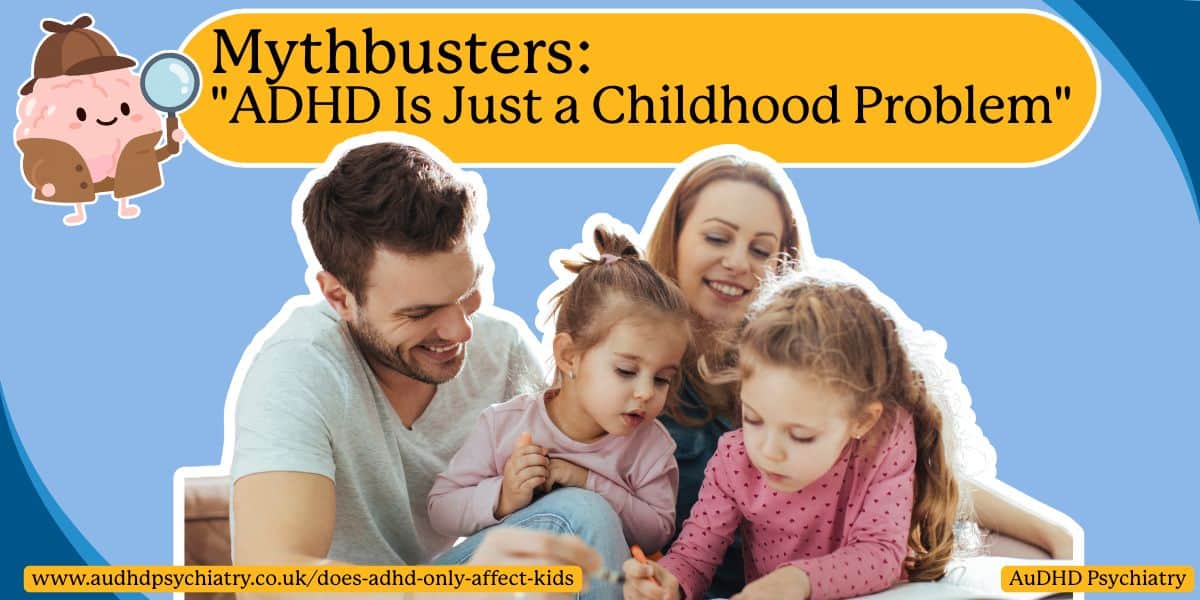
Does ADHD Only Affect Kids?
Many people still believe attention deficit hyperactivity disorder (ADHD) is only a childhood issue linked to immaturity or poor school performance. In reality, ADHD is a recognised neurodevelopmental disorder that can affect individuals throughout their lives. While childhood ADHD is often the focus of awareness campaigns, the condition also persists into adulthood, shaping work, relationships, and mental health.
Dismissing ADHD as something children “grow out of” prevents people from seeking proper support. Research shows that symptoms often change but rarely disappear altogether. For adults, untreated ADHD can lead to difficulties with focus, organisation, and self-esteem.
This article separates myth from fact, raising ADHD awareness and explaining what every adult should know about living with the condition. We’ll also outline how an ADHD evaluation at AuDHD Psychiatry can provide clarity and effective next steps.
ADHD in Adulthood Does Not Disappear
The idea that ADHD simply fades with age is one of the most common misconceptions. While it is true that some children show reduced hyperactivity as they mature, this does not mean their ADHD is gone. Instead, the outward signs change, often giving the impression that the person has “grown out of it.” In reality, attention deficit hyperactivity disorder is a lifelong neurodevelopmental disorder that continues to affect people across their lifespan.
How Symptoms Evolve Over Time
- Visible hyperactivity decreases: adults may no longer run around classrooms, but instead experience inner restlessness, fidgeting, or difficulty relaxing.
- Inattention symptoms persist: distractibility, forgetting details, and losing focus remain common challenges.
- Impulsivity adapts: instead of interrupting lessons, adults may struggle with interrupting conversations or making hasty financial choices.
Daily Lifetime Management Strategies
What often changes is not the ADHD itself but the ability to manage it. Adults learn coping strategies that allow them to function more effectively, such as using reminders, planners, and digital tools. Healthcare providers describe this not as “outgrowing ADHD,” but as developing stronger daily lifetime management skills. Without strategies or treatment, however, many continue to face serious difficulties.
Why Ongoing Support Matters
Untreated ADHD in adulthood can contribute to missed deadlines, relationship problems, and low confidence. For some, medication greatly helps in balancing symptoms, while others benefit from structured therapy. In the UK, both the NHS and private specialists provide access to support. At AuDHD Psychiatry, adults can discuss ADHD medication as part of a personalised treatment plan that addresses ongoing challenges. If you’ve been recently diagnosed and are considering your next steps, now may be the right time to start ADHD medication with proper guidance from a qualified clinician.
ADHD does not disappear. Instead, it adapts. Recognising this ensures that adults receive the same attention and care as children, rather than being left to cope in silence.
ADHD Across the Lifespan
ADHD is not a static condition. Instead, its intensity and visibility shift depending on age, environment, and stress levels. Some children appear to manage their symptoms well in supportive school settings, only to experience difficulties again when workplace or family demands increase. This fluctuation leads some to mistakenly assume ADHD “comes and goes.”
In truth, the condition is always present. It simply interacts differently with life circumstances.
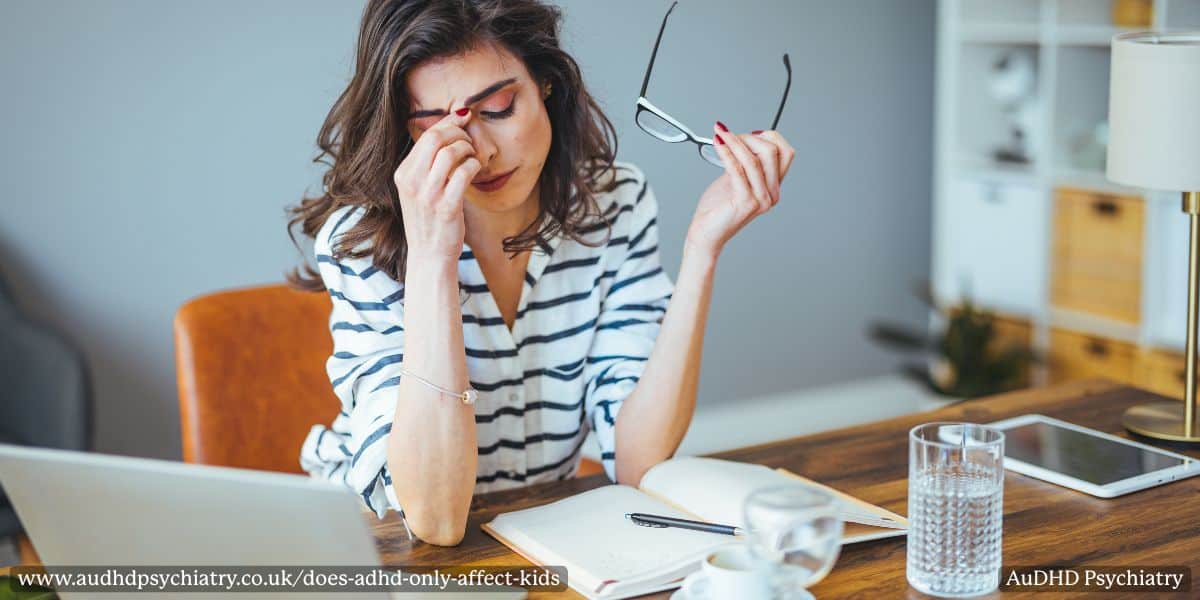
The Role of Environmental Factors
Research consistently shows that environmental factors can influence how ADHD presents. Common examples include:
- Stable routines: a structured home or supportive school can help reduce symptoms.
- Workplace pressures: adults often find ADHD intensifies with deadlines, meetings, and high expectations.
- Parenting demands: raising children places greater strain on executive function, leading many parents with ADHD to feel overwhelmed.
Research Findings
Research projects reveal that the most common symptoms often feel manageable during calm life stages but resurface during stress. A person who appeared to have “outgrown” ADHD in their teens may struggle again when faced with the complexities of adult life. This demonstrates that ADHD is not cured. It simply shifts in expression.
Why Consistency Matters
This waxing and waning pattern reinforces the importance of continuous awareness. ADHD requires long-term recognition and management, rather than the false reassurance of a childhood-only problem. For further insight into how symptoms manifest later in life, our guide on ADHD in adults explores how the condition continues beyond childhood.
Recognising ADHD as a lifelong condition helps adults seek support at the right time, preventing unnecessary setbacks in work, relationships, and self-esteem.
What If You Never Had ADHD as a Kid?
Another persistent myth is that ADHD must always be obvious in early childhood. While most cases are identified in school, many individuals only receive an ADHD diagnosis as adults. This late recognition does not mean the disorder suddenly appeared. It means the signs were missed, minimised, or misattributed.
Why ADHD Is Missed in Childhood
Some children do not display obvious hyperactivity. Instead, they show inattention symptoms, such as daydreaming or quiet forgetfulness, which teachers may mistake for immaturity or lack of interest. Girls in particular are at risk of being overlooked, as their ADHD often looks different from the disruptive stereotype.
The Impact of Late Diagnosis
Adults who were not diagnosed as young children frequently describe years of struggle with trouble concentrating, chronic disorganisation, and low self-confidence. These challenges often become clear when they face independent living, demanding jobs, or higher education. Late-diagnosed adults often feel relief when their difficulties are finally explained by a professional. If this resonates with you or someone you know, neurodivergent assessments for individuals can provide clarity and a path forward to manage the challenges associated with ADHD.
The Crucial Role of Accurate Evaluation
The crucial role of proper assessment is to provide answers and a pathway forward. Without evaluation, many adults continue to believe their challenges reflect personal failings. In reality, their symptoms are part of a recognised neurodevelopmental disorder that requires support. If you suspect you may have ADHD, learning about ADHD is a valuable starting point. From there, booking an ADHD evaluation can confirm whether your experiences align with the diagnostic criteria and guide you toward effective treatment.
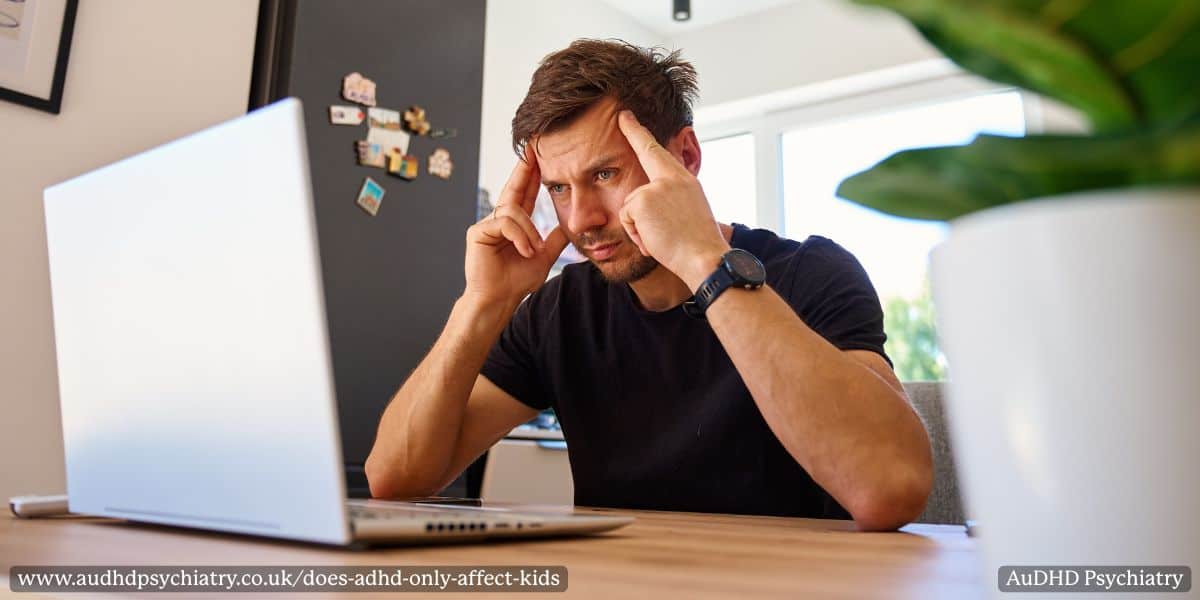
Adult ADHD Symptoms You Might Miss
When people think about ADHD, they often picture children bouncing around classrooms or struggling to sit still. Yet adult ADHD presents differently, and the signs can be easy to overlook. Recognising these subtler expressions is essential for early support and effective treatment.
Problems Focusing and Trouble Concentrating
Adults with ADHD frequently report trouble concentrating on routine tasks. They may begin projects with enthusiasm but struggle to finish them, often losing track of time. Unlike occasional distractibility experienced by neurotypical people, this pattern is persistent and affects both work and home life. These ongoing inattention symptoms are a key part of an ADHD diagnosis and are explored in detail during the clinical process for ADHD assessment.
Difficulty With Organisation
Organisation problems are another hallmark of ADHD symptoms in adults. Many describe chronic disorganisation that affects workplace performance, finances, and even managing household responsibilities. Missed deadlines, misplaced items, and inconsistent planning reflect challenges in executive function rather than poor effort. Over time, these issues can undermine self-confidence and career growth.
Forgetfulness and Memory Issues
Forgetfulness extends beyond the occasional missed appointment. Adults with ADHD may regularly forget commitments or important dates, leading to tension in relationships. This persistent forgetfulness often contributes to low self-esteem and stress, reinforcing the need for targeted strategies.
Restlessness, Inner Agitation, and Excess Energy
Unlike childhood ADHD, where hyperactivity may be outward and obvious, adults often experience internal restlessness. This may appear as constant fidgeting, racing thoughts, or difficulty relaxing during downtime. Many describe it as “never switching off,” which can lead to exhaustion and frustration.
Learning to recognise these adult-specific traits is vital. If you identify with these experiences, exploring resources on common ADHD symptoms can help clarify whether your challenges align with the condition.
Is This ADHD?
It is tempting to believe that modern life explains why so many people feel distracted. Smartphones, constant notifications, and demanding schedules leave the vast majority of people feeling scattered. This has fuelled the popular claim that adults starting to act like they’re living with ADHD. While relatable, the phrase is misleading and risks dismissing ADHD as a legitimate disorder.
Everyday Distractibility vs ADHD
- Modern distraction: checking emails, switching between tasks, or forgetting an item at the supermarket are common for most people.
- ADHD: involves persistent, lifelong challenges with attention, impulse control, and regulation, linked to differences in brain development and communication pathways.
True ADHD is not just a by-product of digital overload. It is a neurodevelopmental disorder defined in the Statistical Manual of Mental Disorders, with clear diagnostic criteria.
Why Misconceptions Are Harmful
Equating ADHD with ordinary distraction minimises the challenges of those living with the condition. It:
- Encourages stigma by framing ADHD as poor self-control.
- Delays proper assessment and ADHD evaluation.
- Undermines public efforts, including ADHD Awareness Month, which aim to improve understanding.
Self-diagnosis poses dangers, especially to those who may self-administer treatment, and thus should be avoided. Getting a professional assessment is key.
Raising Awareness with Accurate Information
ADHD awareness requires distinguishing between the everyday stress of a fast-paced society and the measurable neurological differences of ADHD. By highlighting this difference, we strengthen campaigns and educational initiatives that promote accurate support.
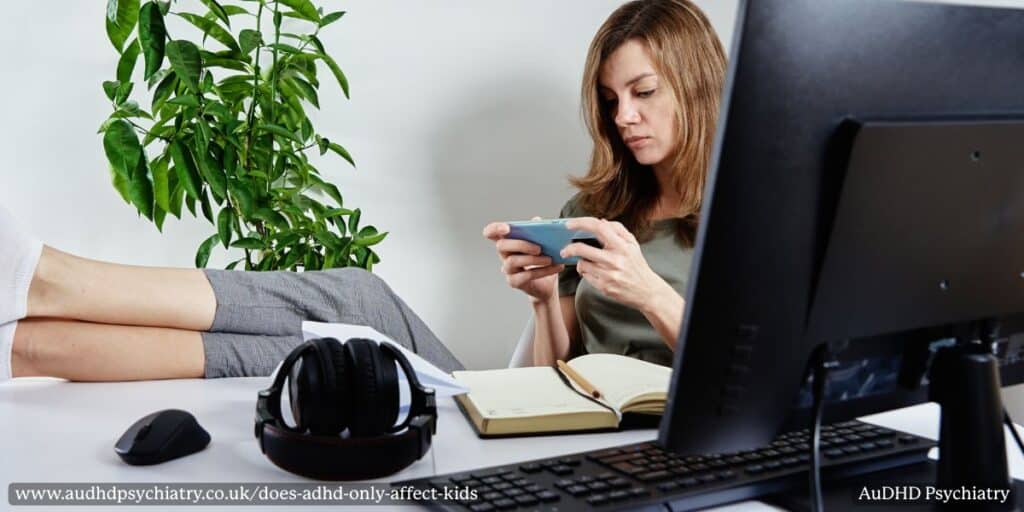
Why ADHD Often Goes Unseen in Adult Women
For decades, ADHD was primarily associated with boys who displayed obvious hyperactivity disorder traits. This stereotype left many women, and other under-recognised groups, without proper diagnosis or support. Today, we know that ADHD in adults is not limited to one gender, and overlooking women has caused widespread harm.
Why ADHD Is Missed in Women
- Subtler symptoms: Women often show inattention symptoms such as forgetfulness or daydreaming, rather than overt restlessness.
- Masking behaviours: Many women compensate by over-preparing, overworking, or hiding difficulties to appear “in control.”
- Misdiagnosis: Emotional struggles may be attributed to other mental health concerns like anxiety disorders and post-traumatic stress disorder, rather than ADHD.
The Impact of Misdiagnosis
Being overlooked delays the first step towards support. Women often grow up with feelings of inadequacy, despite strong effort and intelligence. This can lead to:
- Persistent low self-esteem.
- Strained relationships due to forgetfulness or inconsistency.
- Burnout from managing both household and workplace responsibilities.
Building Awareness and Support
Improving recognition of adult ADHD in women is essential. More inclusive research and awareness campaigns are beginning to highlight the unique experiences of women, paving the way for earlier ADHD diagnosis and treatment. Every individual who struggles with ADHD traits deserves recognition, accurate evaluation, and access to the best treatment options that allow them to thrive.
The Risks of Believing ADHD Only Affects Kids
One of the most damaging misconceptions about ADHD is that it only affects children. When adults dismiss ADHD as a childhood phase, they overlook the real risks of leaving the condition untreated.
Mental Health Complications in Adulthood
Untreated ADHD often leads to broader mental health issues. Adults may experience:
- Depression from repeated struggles with work or relationships.
- Anxiety disorders linked to constant overwhelm and disorganisation.
- Increased risk of substance abuse as individuals self-medicate to manage symptoms.
These outcomes highlight why recognising ADHD beyond school years is critical for long-term wellbeing.
Delayed Interventions and Missed Opportunities
Failing to acknowledge ADHD in adults can delay important interventions. Many never take the first step toward treatment, such as an ADHD evaluation or exploring evidence-based support. Families also miss out on resources like parent training, which can improve outcomes for both children and parents navigating ADHD together.
Individuals who may have ADHD and are diagnosed late can experience having a hard time at work/school, maintaining relationships with family members and others, and managing daily activities.
Self-Esteem and Positive Behaviours
Adults who believe ADHD is “just a childhood issue” often grow up feeling inadequate. Low awareness prevents them from recognising the positive behaviours that come with ADHD, such as creativity and problem-solving. Instead, the focus remains on challenges, fuelling low self-esteem and limiting career or personal growth.
The truth is clear: dismissing ADHD as a childhood condition is harmful. Awareness, accurate diagnosis, and early treatment are essential to prevent these negative consequences and build a healthier future.
How ADHD Is Diagnosed in Adults
Diagnosis is often the turning point for adults who have spent years feeling overwhelmed. Contrary to the myth that ADHD “fades with age,” specialists confirm that accurate diagnosis is possible and necessary, well into adulthood.Many adults choose a professional ADHD assessment service to gain clarity and move forward with the right support.
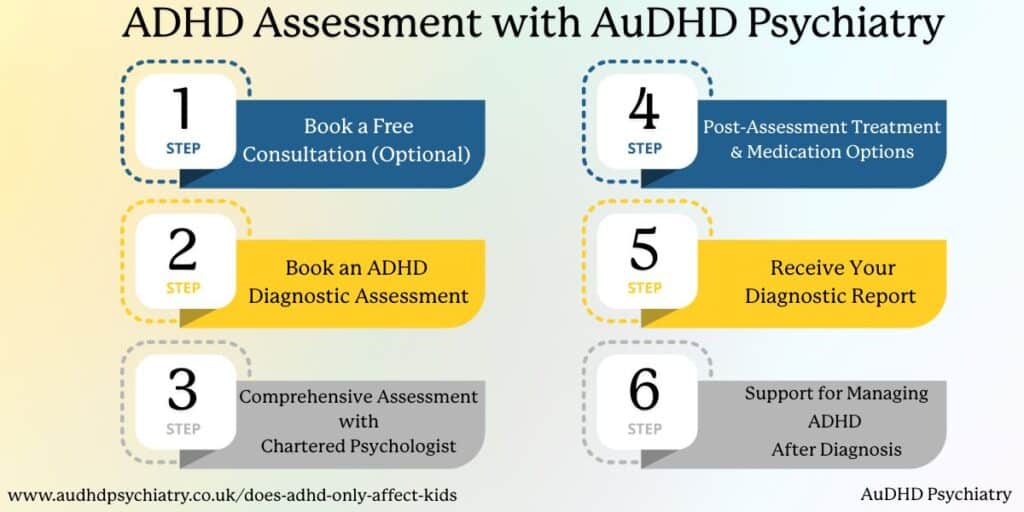
ADHD Assessment with AuDHD Psychiatry
Getting an ADHD assessment is the most reliable way to move from uncertainty to clarity. While online symptom checklists can highlight possible traits, they cannot replace a structured evaluation carried out by qualified healthcare providers. At AuDHD Psychiatry, we follow a comprehensive process designed to support you from the very first consultation through to post-diagnosis care.
Here’s a 6-step breakdown of our process:
Step 1: Book a Free Consultation (Optional)
We begin with a short, no-obligation consultation. This gives you the chance to discuss concerns, whether that’s persistent inattention, struggles with organisation, or co-existing mental health issues such as anxiety disorders or post-traumatic stress disorder.
Step 2: Book an ADHD Diagnostic Assessment
If you wish to proceed, you can book a full assessment. This step involves structured questionnaires and interviews that go beyond simple online tests.
Step 3: Comprehensive Assessment with a Chartered Psychologist
Our clinicians provide an in-depth evaluation that explores not only ADHD traits but also other conditions that may overlap, ensuring you get the right diagnosis.
Step 4: Post–Assessment Treatment and Medication Options
Following the evaluation, we outline treatment pathways. These may include evidence–based medication, therapy, and lifestyle strategies.
Step 5: Receive Your Diagnostic Report
You will be given a detailed written report that you can use for academic, occupational, or personal support.
Step 6: Support for Managing ADHD After Diagnosis
We don’t stop at diagnosis. Ongoing support helps you manage symptoms effectively and develop strategies tailored to your daily life.
By choosing AuDHD Psychiatry, you gain access to experienced healthcare providers who understand the complexity of ADHD and its overlap with other mental health issues. Our goal is to provide clarity, compassionate care, and ongoing guidance every step of the way.
Why Diagnosis Matters
Without an accurate ADHD diagnosis, many adults continue to blame themselves for difficulties in time management, relationships, or workplace performance. Diagnosis opens the door to best treatment plans, strategies for daily lifetime management, and improved quality of life.
For those unsure about where to begin, starting with a self-screening such as our Free ADHD Online Test can provide clarity before seeking professional evaluation.
Effective Treatment and Management for Adults
Receiving a diagnosis is only the beginning. The good news is that ADHD can become manageable with a combination of treatments plus strategies tailored to each person’s needs.
Medication and Therapy Options
- Stimulant medication is often recommended by healthcare providers as a first-line treatment, helping regulate attention and reduce impulsivity.
- Non-stimulant alternatives exist for those who do not respond well to stimulants.
- Therapy, including cognitive behavioural approaches, supports skills in organisation, planning, and emotional regulation.
These evidence-based options form the best treatment plans for many adults.
Lifestyle and Practical Supports
Alongside medical treatment, lifestyle changes play a crucial role in outcomes. Addressing sleep problems, building consistent routines, and using time-management tools can dramatically improve functioning. Workplace accommodations such as flexible hours, task reminders, and coaching also empower adults to succeed.
A Combined Approach for Lasting Change
The most effective treatments are rarely one-size-fits-all. Combining medication, therapy, and workplace strategies ensures both symptom control and long-term habit building. Adults who engage with support often report higher productivity, improved relationships, and greater confidence.
Does ADHD Only Affect Kids: Conclusion
ADHD is not confined to childhood, nor is it something people simply “grow out of.” Research shows that symptoms often evolve rather than disappear, influencing focus, organisation, relationships, and self-esteem well into adulthood. Believing ADHD only affects kids delays diagnosis, treatment, and support, leaving many adults to struggle in silence. Recognising ADHD as a lifelong neurodevelopmental condition is essential for breaking stigma and improving quality of life.
ADHD is not a barrier to living well. With the right strategies, adults can turn challenges into strengths. If any of these resonated with you and you’d like to book an ADHD assessment, or if you’ve already been diagnosed, manage your symptoms, book a call with us today.
You Might Also Like
Contact Us
We’re here to answer any questions you might have.
Get in Touch
Opening Hours
Contact Form
We’re here to help. Reach out and we’ll get back to you within 24 hours (Monday – Friday).

Leave a Reply